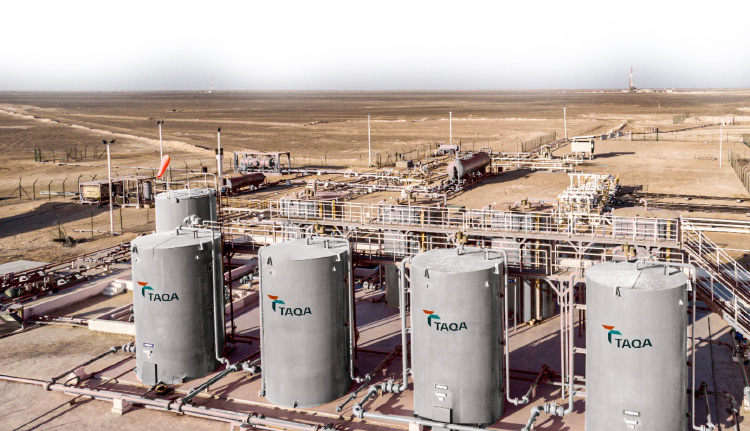An Early Production Facility (EPF) serves as a modularized integrated solution for expediting oil and gas production, allowing customers to initiate production swiftly. The timely commencement is crucial for realizing commercial advantages. Many oil and gas operators favour EPFs for the development of marginal fields or to rapidly generate revenue from fields before establishing a permanent facility. This approach offers both financial and operational advantages in the realm of oil and gas production.
TAQA offers a comprehensive solution for an EPF package, encompassing various equipment categories:
Gas Treatment: This includes Gas Compression, Gas Sweetening units, Gas Dehydration units, Dew Point Control units, and Gas Metering systems.
Oil Treatment: The package involves Three Phase Separators, Crude Oil Heaters, Electrostatic Desalters/Heater Treaters, Crude Stabilization units, Crude Storage, Metering, and Pumping Units.
Produced Water: TAQA incorporates CPI Separators, De-oiler Hydro cyclones, Induced Gas Flotation (or DGF/DNF), and Nutshell Filters.
E&I Package: This features an Integrated Control and Monitoring system (PLC) and ESD system.
Structural Modules: Utilizing modularized skids for convenient transportation.
Plant Utilities: This includes power generation, instrument air packages, fire water systems, fire and gas detection, flare systems.
TAQA optimizes the process by sourcing process equipment from existing inventory, configuring it offsite, and requiring minimal on-site construction for piping and ancillaries during installation.
Moreover, TAQA provides additional value by offering EPFs on either a lease or sale basis, showcasing over 30 years of experience with production facilities in more than 20 countries.
The standard scope of a TAQA Early Production Facility (EPF) project encompasses engineering, procurement, construction, commissioning, operation, and maintenance.
In terms of engineering, TAQA covers various disciplines, including process, instrument and control, electric, piping, mechanical, and civil. Throughout detailed engineering, TAQA delivers all necessary outputs to meet client expectations, ensuring that the facility complies with required product specifications. The engineering depth allows for detailed HSE studies (HAZOP, HAZID, SIL studies) to guarantee safe facility design and operation.
Regarding procurement, TAQA aims to maximize the use of available equipment to minimize facility delivery time for swift cash flow. Special process equipment follows a procurement cycle ensuring timely delivery meeting specified requirements.
The construction phase adheres to a modular concept, fabricating skids and pipings offsite to reduce onsite construction and installation time. Minimal civil work is required, expediting construction for fast-track commissioning.
During pre-commissioning and commissioning, a detailed documented procedure is prepared. Following mechanical completion, activities commence based on the prepared procedures, with all involved parties signing off. Fluid flow begins, and operational activities ensure the delivery of the final on-spec product.
In terms of operation and maintenance, a well-experienced, trained, and qualified personnel operate the EPF facility safely, adhering to all HSE rules and regulations. Scheduled product analysis and daily production reports are conducted, and planned inspection preventive maintenance follows the maintenance schedule, complying with company, client, and international HSE standards.
TAQA has successfully implemented EPFs across multiple countries in the MENA Region and East Africa, achieving a production rate exceeding 2 million barrels per month in specific countries. Notably, the TAQA EPF in Kenya marked a historic milestone as the country’s first oil production facility. The inauguration ceremony was graced by the presence of the President of Kenya, underscoring the national-level benefits that EPFs can bring.
The EPF is adept at processing highly intricate well fluids, ensuring the attainment of final product specifications with minimal environmental impact and utilizing the least possible equipment. Particularly in fields dealing with heavy oil possessing an API less than 10, the EPF solution proves uniquely advantageous. This presents a financial gain, considering that such complex crude would necessitate a more extended timeline if produced through a conventional Engineering, Procurement, and Construction (EPC) project.
In certain scenarios, EPF projects boast an exceptional timeline, enabling oil production within a mere two months from contract award, all while upholding stringent Health, Safety, and Environment (HSE) standards. This rapid turnaround leads to swift cash flow from previously abandoned wells in remote areas.
In conclusion, the TAQA EPF concept is recognized for its simplicity and ease of implementation, resulting in immediate benefits like accelerated oil production and rapid cash flow upon adoption. As a leading global supplier, TAQA aims to expand its EPF capabilities to new markets.








